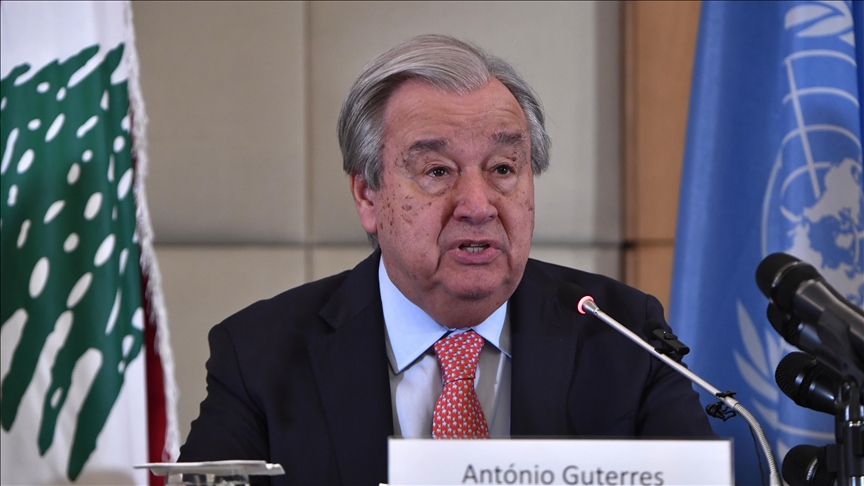UN chief calls on member states to 'support all efforts to implement' Gaza ceasefire
Antonio Guterres urges Security Council, countries to promote 'permanent cessation of hostilities, ensure accountability, and create conditions for recovery and reconstruction' of Gaza

HAMILTON, Canada
The UN chief on Monday called on the Security Council and member states to "support all efforts to implement" the new ceasefire in Gaza.
Addressing a high-level session at the UN Security Council on the Mideast, Antonio Guterres said: "The Middle East is in a period of profound transformation – rife with uncertainty, but also possibility."
"It is clear the region is being reshaped. But it is far from clear what will emerge. We have a responsibility to help make sure the people of the Middle East come out of this turbulent period with peace, dignity, and a horizon of hope grounded in action," he said.
Calling the Gaza ceasefire "a ray of hope," the UN chief praised the “long-overdue relief."
"We are doing our part to ensure the rapid scaling up of humanitarian deliveries," he said, adding that over 630 humanitarian aid trucks entered Gaza on Sunday, with 300 reaching the north.
Calling on all sides to "make good on their commitments and fully implement the deal," Guterres also called on the council and UN member states "to support all efforts to implement this ceasefire, bring about a permanent cessation of hostilities, ensure accountability, and create the conditions for recovery and reconstruction."
Guterres outlined four key actions required on the ground, calling the UN agency for Palestinian refugees (UNRWA) “the backbone" of the UN's humanitarian response and saying it should operate "without hindrance," in a tacit message to Israel, which has moved to outlaw the agency.
He also stressed that aid delivery must be safe and well-coordinated, access must be provided to medical evacuations and aid for those in need, and the protection of civilians must be ensured with safe passage and the removal of explosive ordnance.
"The international media must also be allowed into Gaza to report on this crucial story on the ground," he added.
West bank, illegal settlements, Lebanon
He further called for the Palestinian Authority to assume its governance responsibilities and for Gaza to be politically and administratively unified with the occupied West Bank.
He also expressed concern over the deteriorating situation in the occupied West Bank, decrying "clashes, airstrikes, and illegal settlement expansion."
Guterres said Israeli administrative changes over the past two years have "streamlined and accelerated the settlement approval process," referring to illegal Israeli settlements.
Criticizing senior Israeli officials' remarks about annexing parts of the occupied West Bank, Guterres said: "Any such annexation would constitute the most serious violation of international law."
"It is clear that greater stability in the Middle East requires irreversible action toward a two-state solution, with Israel and Palestine living side-by-side in peace and security, in line with international law, relevant UN resolutions, and previous agreements, with Jerusalem as the capital of both states," he said.
On his recent visit to Lebanon, the UN chief said a "new dawn is rising in Lebanon" with the potential formation of a government that represents all Lebanese and ensures security for its citizens.
He emphasized that while the cessation of hostilities remains "fragile," the UN peacekeeping force there (UNIFIL) is working closely with the Lebanese Armed Forces to maintain stability.
"It is vital that the Israeli presence in the south must end as defined in the agreement, and that the Lebanese Armed Forces are present in the totality of Lebanon," he said.
On Syria, he called for an "inclusive political transition" to address the country's economic challenges and ensure international support.
"As the region is undergoing a profound transformation, we must spare no effort to help shape it in the form of more justice, dignity, human rights, and peace for all the people of the Middle East," he said.








